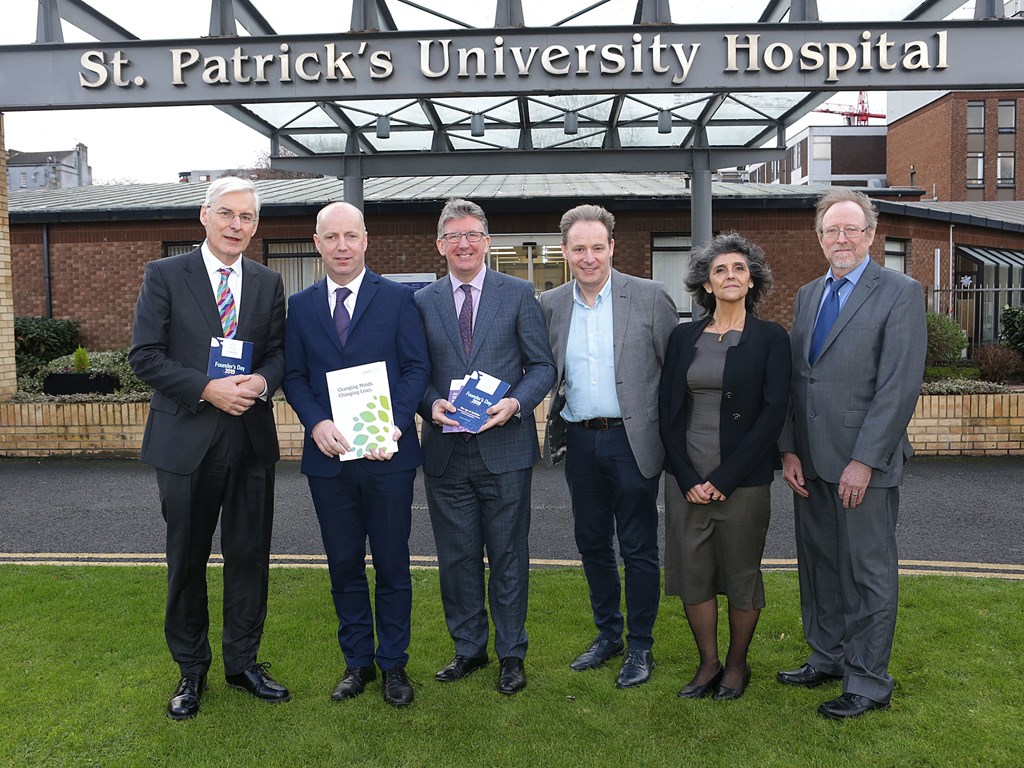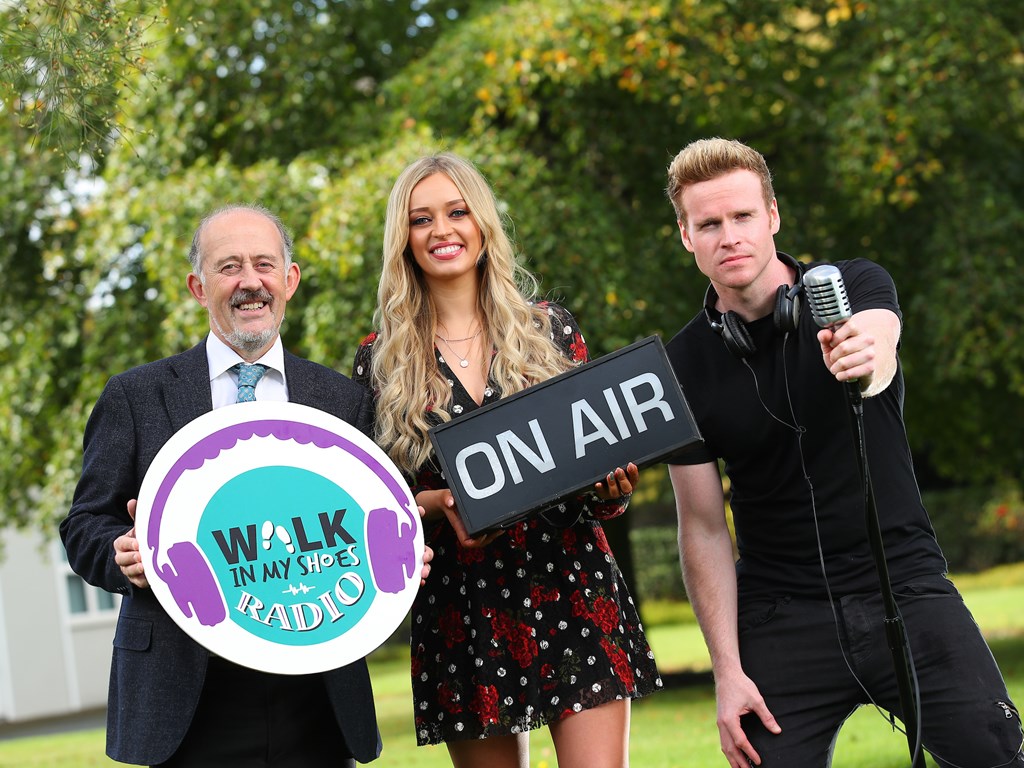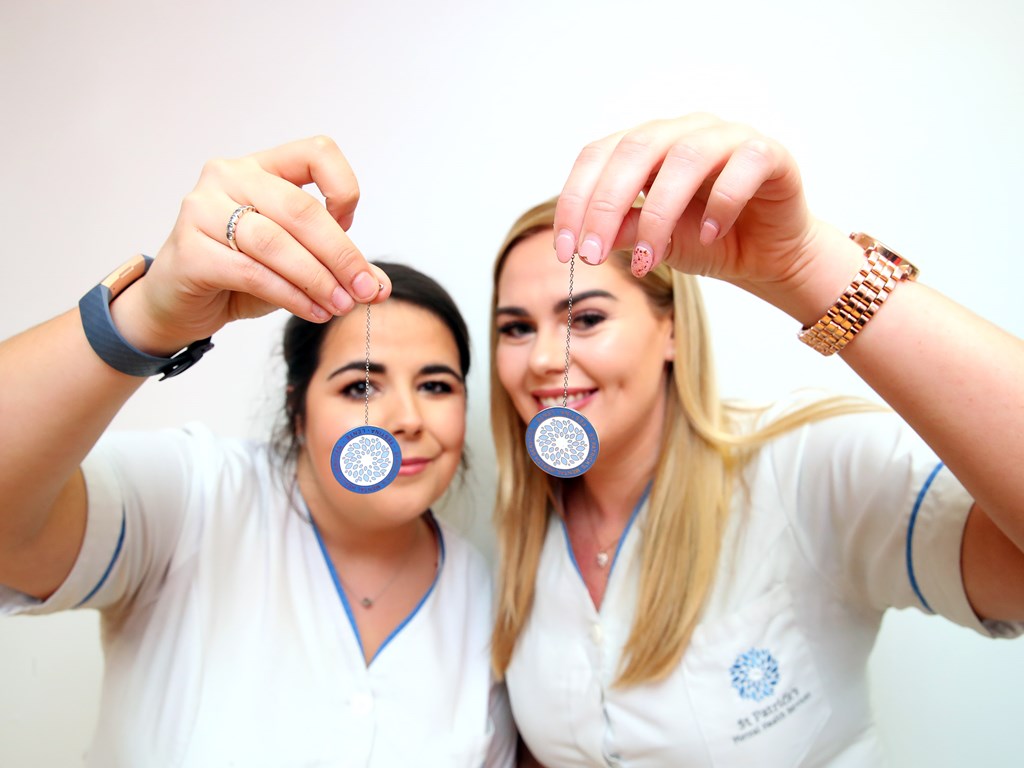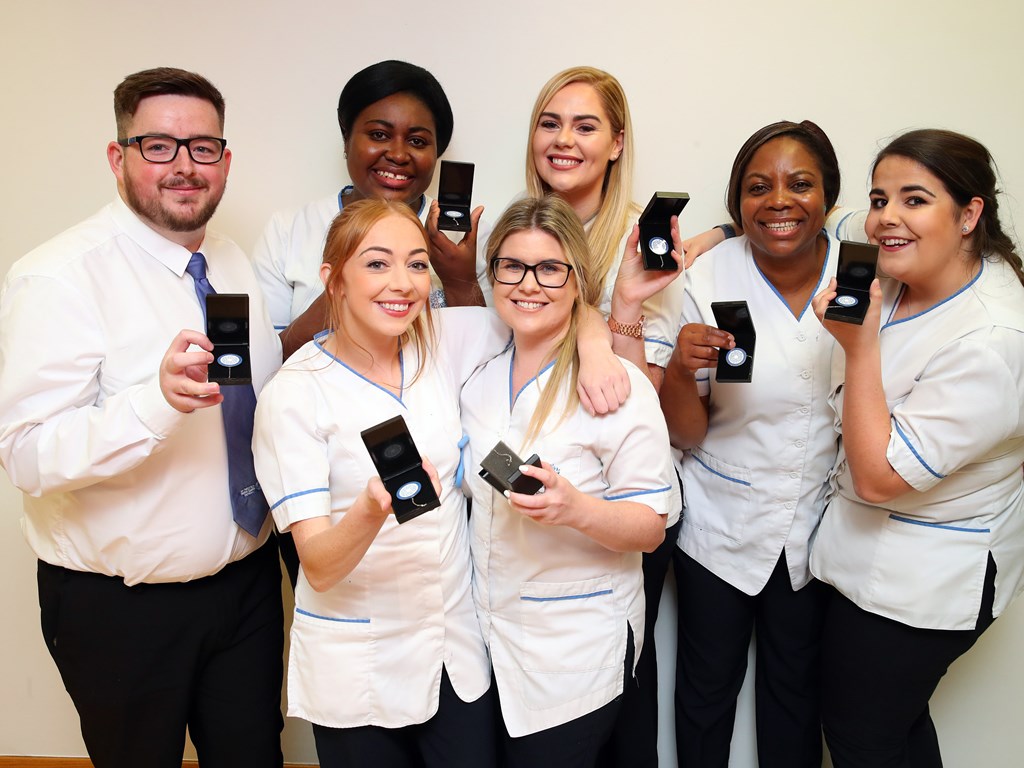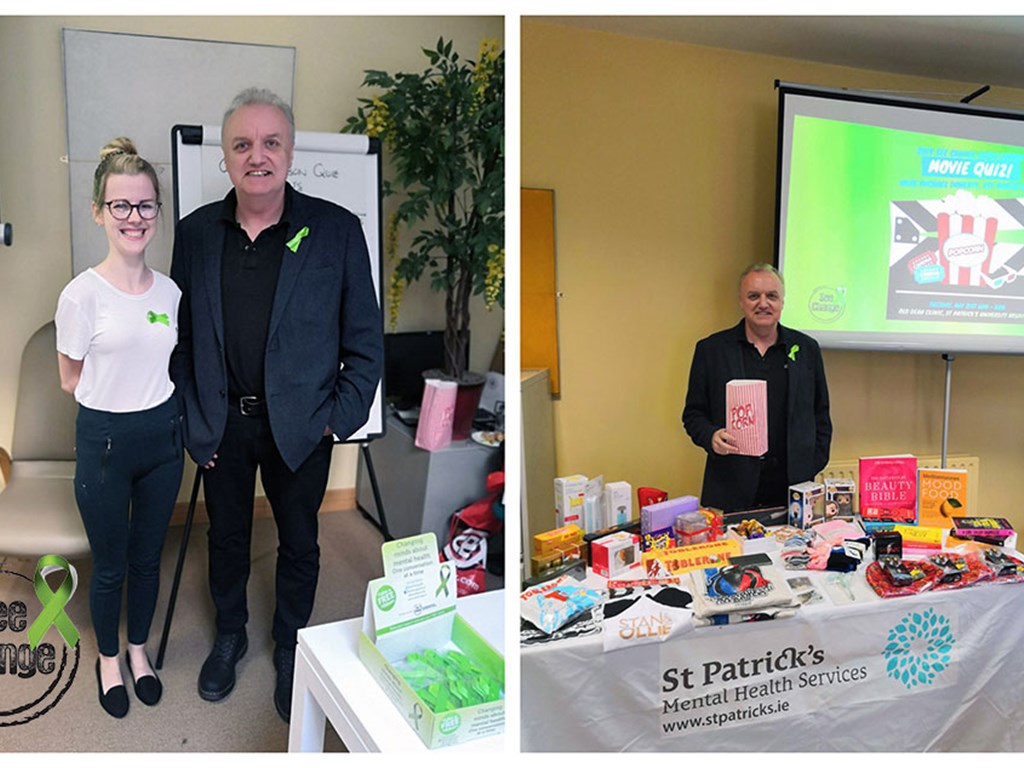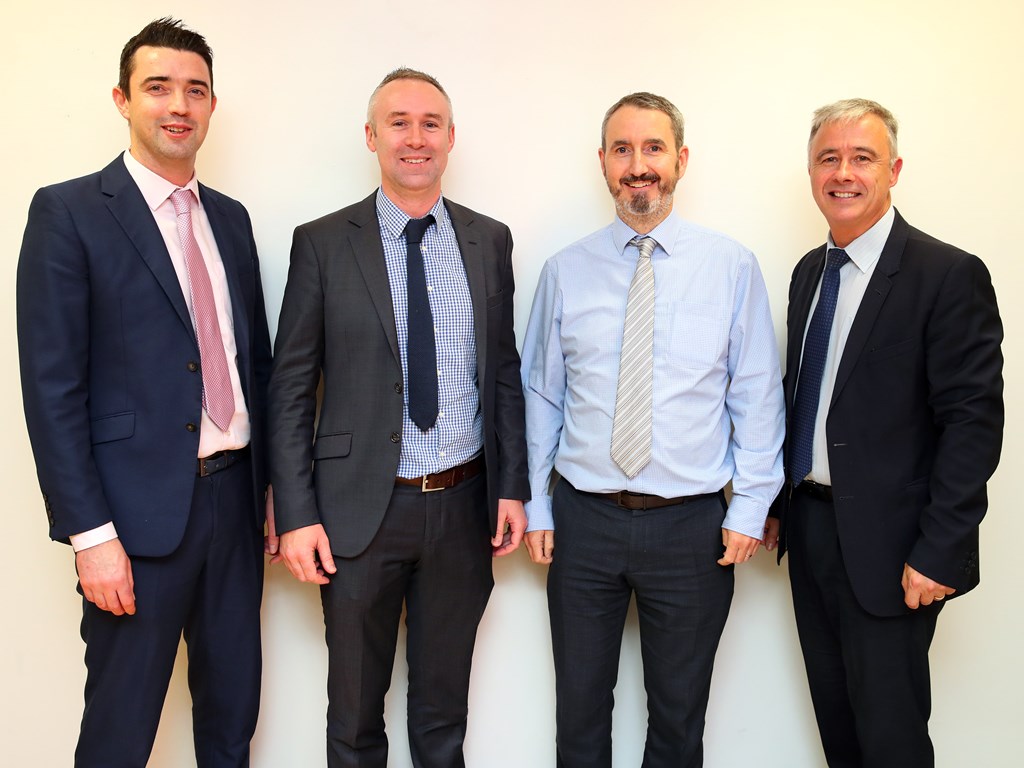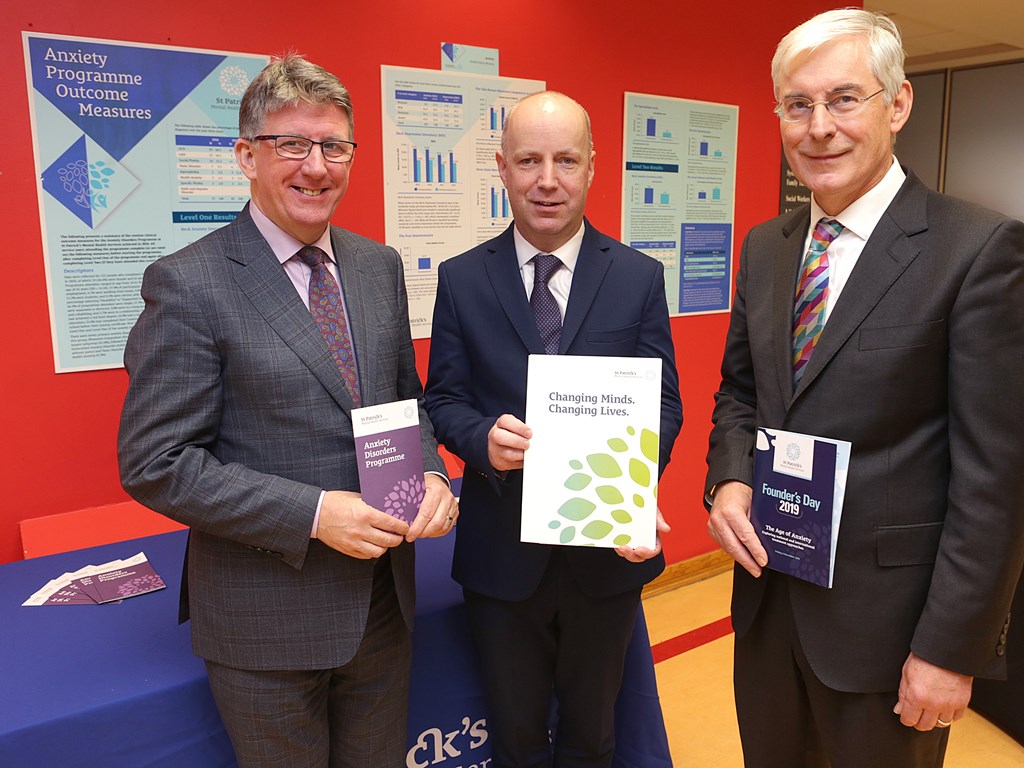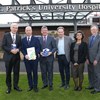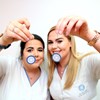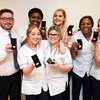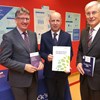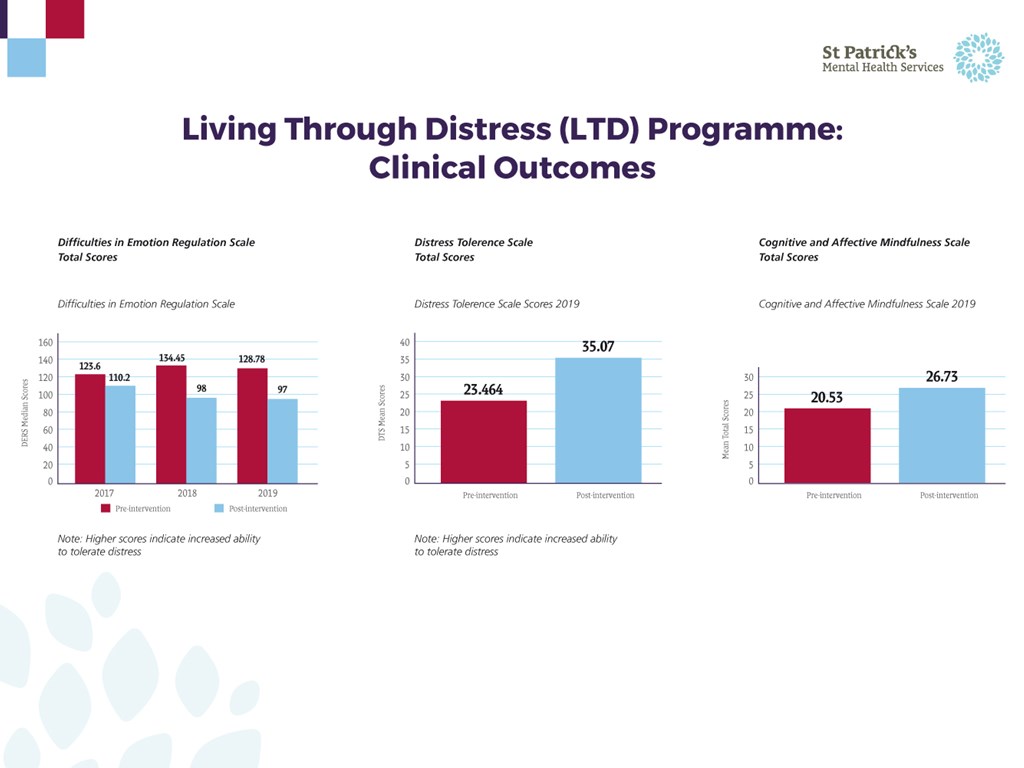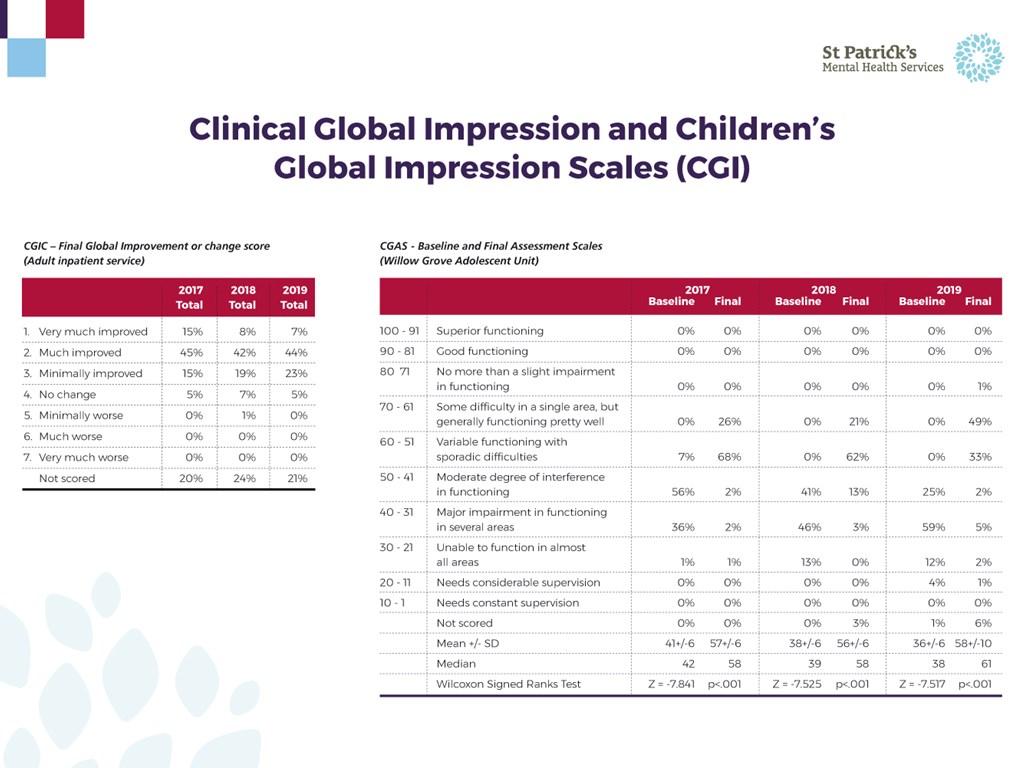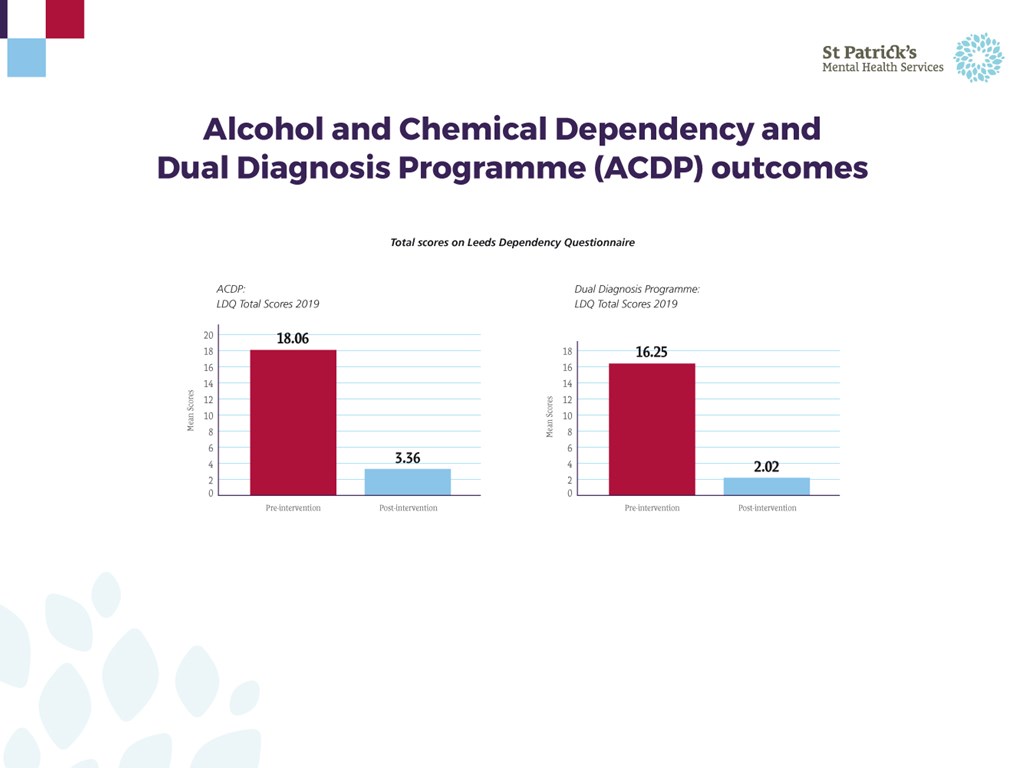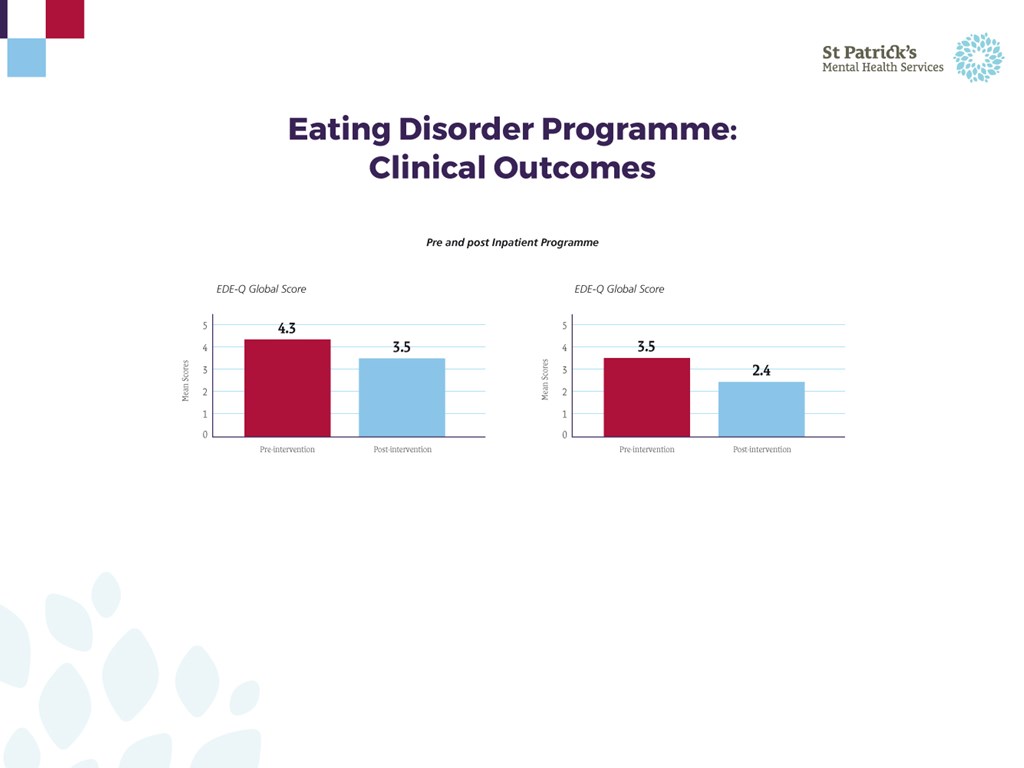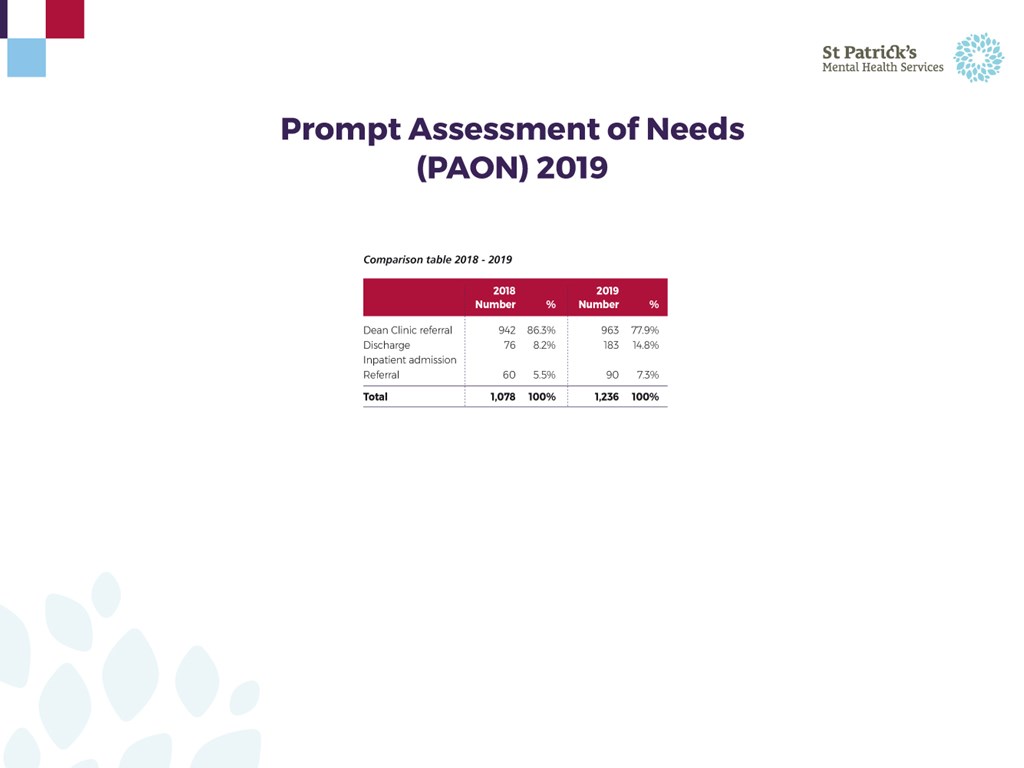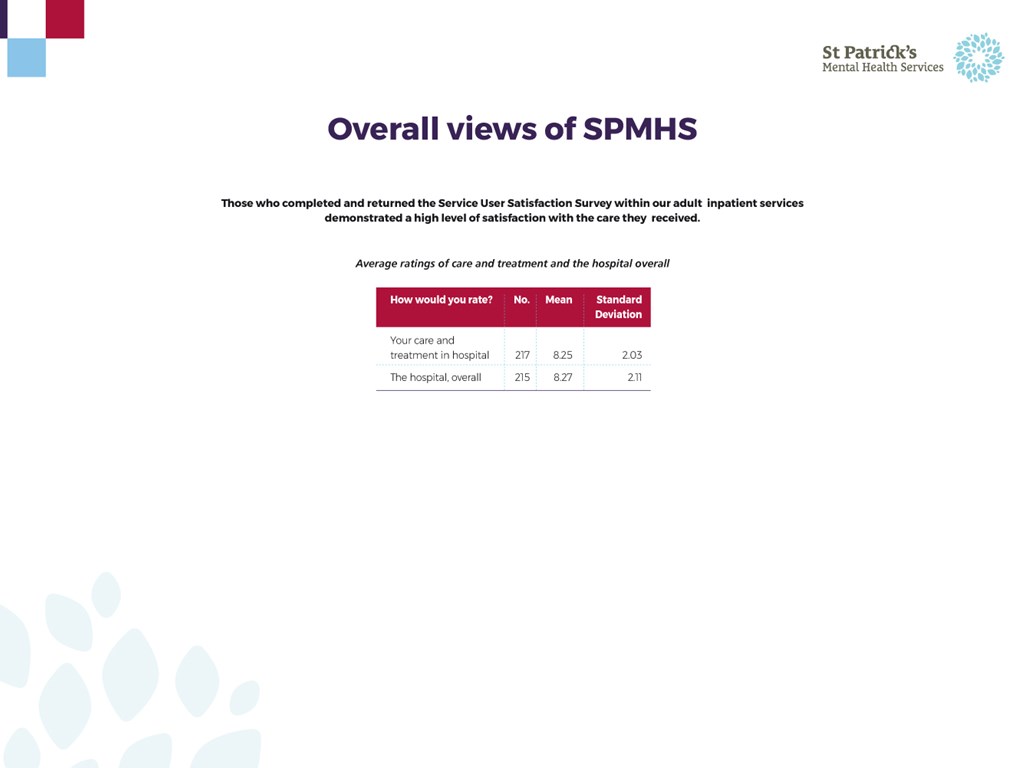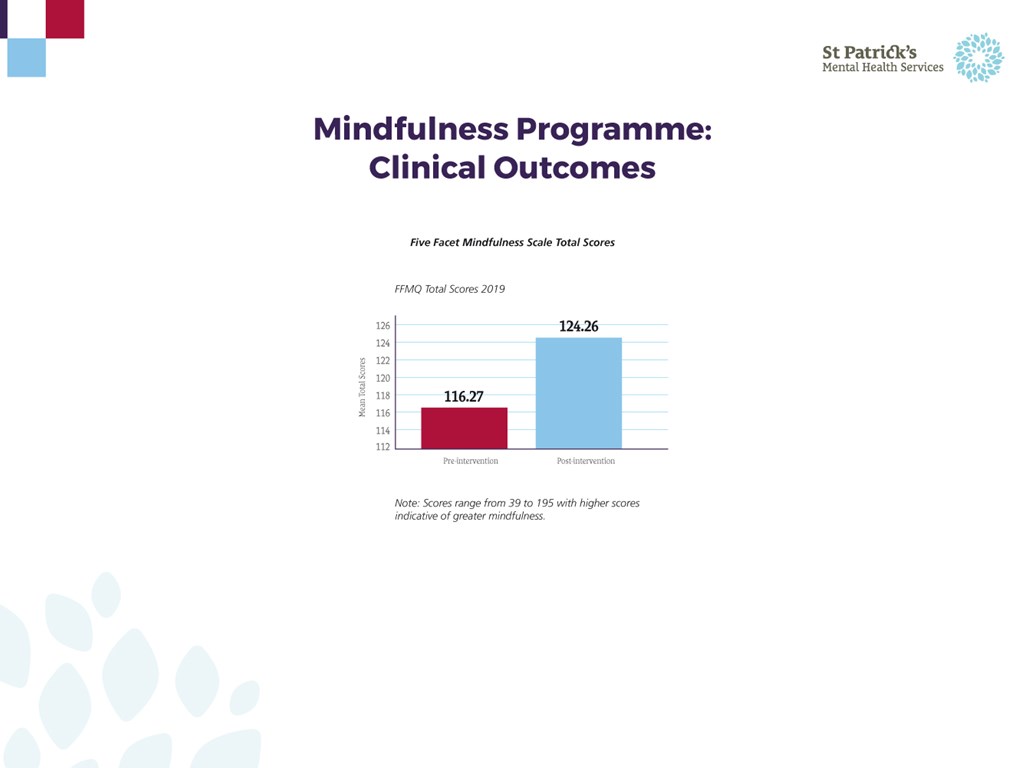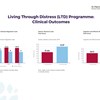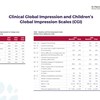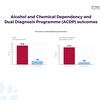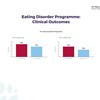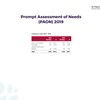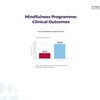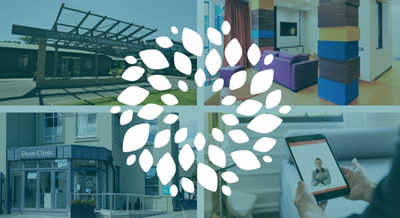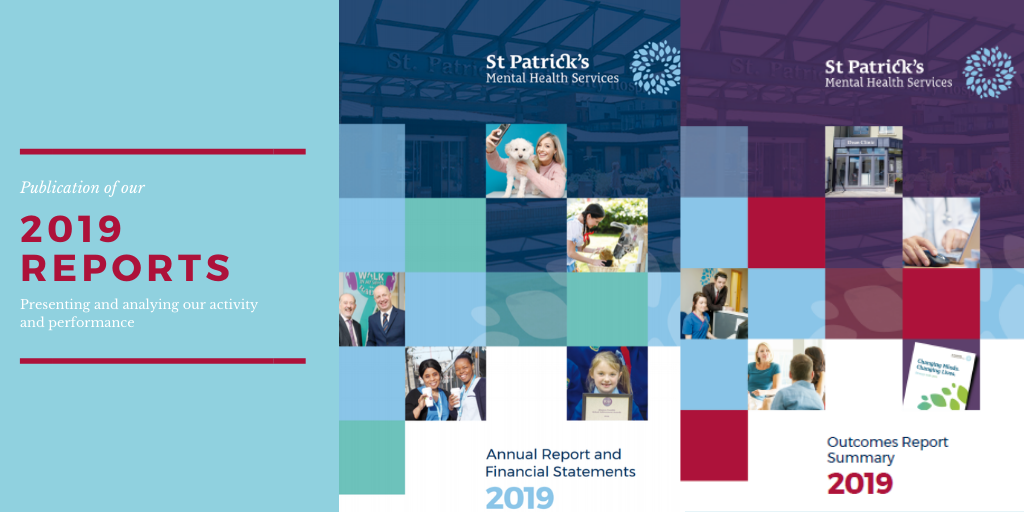
St Patrick’s Mental Health Services (SPMHS) is delighted to announce the publication of our latest Annual Report and Outcomes Report, which present and evaluate our activity and performance in 2019.
The reports reflect that, in 2019, we continued to develop and evolve in line with the principles and objectives of our Changing Minds. Changing Lives. strategy.
Snapshots from our Annual Report
Our Annual Report covers our activity during the year under the key headings of service delivery, advocacy, research and education, and service user engagement. Our financial statements for the year are also included in the report.
Click here to read our 2019 Annual Report in full, or find some of the highlights of the year below.
-
Service delivery
The 2019 edition reveals how each of our services saw robust demand during the year. Over the course of the year, there were 2,360 admissions to our inpatient services in St Patrick’s University Hospital (SPUH), 527 to St Patrick’s, Lucan (St Edmundsbury) and 89 to Willow Grove Adolescent Unit (WGAU), while our day recovery services saw a 13% increase in clinical activity. Over 15,000 appointments were also held through our community care Dean Clinic network.
All staff’s commitment to delivering the highest quality mental healthcare again saw us reach an excellent level of compliance with Mental Health Commission (MHC) standards in each of our three approved centres.
2019 also brought considerable efforts to modernise the delivery of our services by utilising new technologies, which, in the context of COVID-19, has proved not only pragmatic but prescient; for example, prudent investment in our IT infrastructure and the digitalisation of our services has helped us to launch a swift, efficient and meaningful response to the current pandemic. Equally, the continued embedding of eSwift, our electronic health record, enhanced monitoring of appointments, improved quality of communications, and strengthened efficiencies in maintaining and transporting clinical files. Our commitment to opening access to our EHR to service users in a phased manner also resulted in the December 2019 agreement with Patient Knows Best to co-design and deliver Your Portal, our online personal health record for service users, which launched on 29 June this year.
-
Advocacy
Our advocacy works reflects our overarching vision of a society where all people are given the opportunity to live mentally healthy lives. A significant aspect of this work therefore aims to eradicate stigma around mental health issues, the importance of which is highlighted in the results of our annual stigma survey, which, in 2019, showed that nearly two-thirds (63%) of people agree that being treated for a mental health problem is seen by society as a sign of personal failure. This is despite most people (93%) acknowledging that anyone can experience mental health difficulties.
Throughout 2019, we made 13 contributions to consultations, including submissions to the Health information and Quality Authority (HIQA), a number of State departments and committees, the National Study on Familicide and Domestic Homicide Reviews, and an international consultation by the World Health Organisation Quality Rights Initiative.
Our Women’s Mental Health Network (WMHN), in partnership with the National Women’s Council of Ireland (NWCI), grew to over 250 members during 2019, while we also took part in various collaborations with SeeChange, First Fortnight, the National Parents Council and more. We also held numerous events throughout the year, such as our Self-Harm Awareness Conference, Recovery Festival, and Founder’s Day, which brought different aspects of mental health awareness and education to a wide range of stakeholders and the general public.
Meanwhile, our Walk in My Shoes campaign enjoyed another very active year, with highlights including its #MindYourSelfie campaign, which reached over three million people on social media; its Mission Possible awards which celebrated schools' initiatives to support mental health; and its annual WIMS FM pop-up radio station, which broadcast over 70 hours of programming to promote positive mental health.
Another milestone of the year came when we received a Special Commendation at the National Adult Literacy Agency (NALA) annual Plain English Awards for our service-wide commitment to becoming a health literacy-friendly organisation.
-
Research and education
Our commitment to clinical research underpins our goal of delivering the highest quality mental health services in the most effective way possible.
Through our partnership with the Trinity College Dublin School of Psychiatry, we have developed an impressive body of research. Along with a number of ongoing research projects, at least five new research initiatives began in 2019, including a qualitative study on experiences and understanding of emotional over-control and the provision and evaluation of bereavement and loss education based on the needs of mental health nursing working in adolescent inpatient services.
Our training office was also consolidated in 2019. In conjunction with several universities, including Trinity College Dublin, Royal College of Surgeons of Ireland and the University of Limerick, we continued to provide training to a wide range of mental health professionals, including those who work in nursing, psychology, psychiatry, social work and occupational therapy, as well as offering post-graduate training in Cognitive Behavioural Therapy (CBT).
-
Service user engagement
We consistently work towards a more inclusive system of service user representation, and believe in the importance of service user insight, expertise and opinions in shaping our services. To enhance this, we appointed a new, full-time Service User Engagement Coordinator in April 2019 and developed Service User Engagement Guidelines for staff to further increase the level of service user engagement across the organisation.
Our Service User and Supporters Council (SUAS) provided input and feedback on our key initiatives and took part in staff interview panels in 2019. SUAS members also presented at the service user morning lecture series in SPUH every six weeks to provide current service users with information about the council’s role and function. Meanwhile, our Service User Advisory Network expanded to 117 members in 2019, with members actively feeding into a number of projects including a focus group for a public awareness campaign on human rights and mental health, and the Your Portal project launch.
2019 also saw the launch of a new Service User Consultative Forum, in which a member of our Board and members of senior management attend a quarterly discussion with service user representatives, and later report to the Board on what was raised; two of these forums were held during the year, covering discussions on Your Portal, service user perceptions of our Dean Clinics, and more.
Highlights from our Outcomes Report
The full report presents outcomes relating to clinical care, clinical governance processes, clinical programmes and service user experiences, compiled across seven different sections. You can read the full report here.
We also produce a summary report which focuses on analysis of clinical outcomes of our services. Click here to read the summary report, or find some of the key findings from our programmes in the graphs below.
Find more reports and information on our work
Continue to…
“Stigma doesn’t matter, I do”: No Stigma campaign launches
